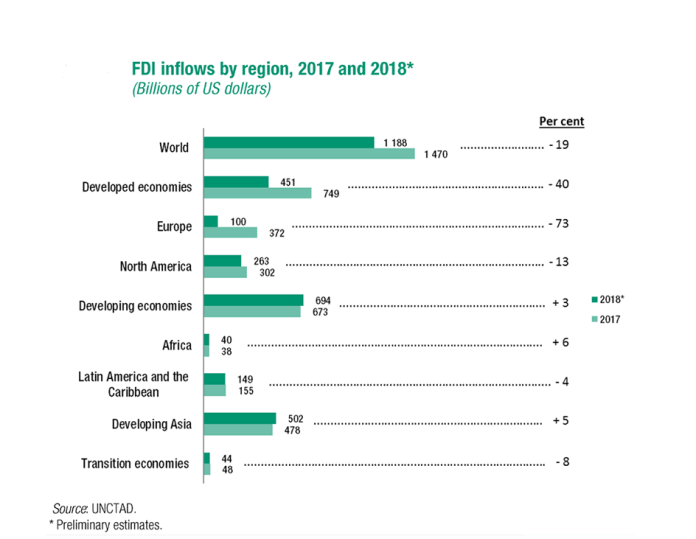New figures released by United Nations Conference on Trade and Development (UNCTAD) recently revealed that Egypt and South Africa attracted the highest rate of international investment flow to Africa during the past year.

“…relatively diversified economies such as Egypt and South Africa saw more stable and increasing FDI inflows,” said the United Nations Conference on Trade and Development (UNCTAD) in its Global Investment Trends Monitor released on Monday.
Egypt, where recent economic reforms have led to improved growth, was Africa’s biggest recipient of FDI in 2018, recording an inflow of $7.9 billion, a 7 percent increase over the $7.4 billion recorded a year earlier. According to UNCTAD, investment inflow was in real estate, food processing, oil and gas exploration and renewable energy.
FDI inflow into South Africa had fallen since 2014, but it recovered in 2018, with large investments in mining, food processing, petroleum refining, information and communications technology, as well as renewable energy. Thus, South Africa received FDI amounting to $7.1 billion in 2018 from $1.3 billion in 2017.
In contrast, Nigeria, Africa’s largest economy and top oil producer saw FDI drop 36 percent to $2.2 billion in 2018. This decline saw Ghana overtake Nigeria as country with the highest FDI in West Africa, recording an inflow of $3.3 billion. While some policy decisions have been blamed for Nigeria’s poor FDI inflow in 2018, UNCTAD expects 2019 to be better for the country, especially due to some significant greenfield project announcement in the oil and gas industry.
Ethiopia was the largest recipient of FDI in East Africa in 2018, despite a 24 percent fall in investments to $3.1 billion. Major investments in the country were in petroleum refining, mineral extraction, real estate, manufacturing and renewable energy.
UNCTAD concludes that progress in the implementation of the Africa Continental Free Trade Agreement (ACFTA), diversification in greenfield projects targeting the manufacturing sector and the stabilisation of commodity prices show that FDI in Africa could potentially grow in 2019 at a higher pace than the 6 percent recorded in 2018.
Meanwhile, global FDI fell by nearly a fifth in 2018 to an estimated $1.2 trillion from $1.47 trillion in 2017.

“The underlying FDI trend has shown anemic growth since the global financial crisis and has been on a downward trajectory since 2013,” James Zhan, Director of UNCTAD’s Investment Division said and painted a grim picture of the future.
“The factors behind this negative trend, such as lower profitability of foreign investment and shifts in global value chains, are not changing in the near future. The macro-economic backdrop is also deteriorating,” he said.
Although a rebound in global FDI is expected in 2019, Zhan says there are still many uncertainties facing the global economy.
“Beyond the immediate impact of economic headwinds, the underlying trends for global FDI remain weak, driven by one-off factors such as tax reforms, megadeals and volatile financial flows,” he said.


